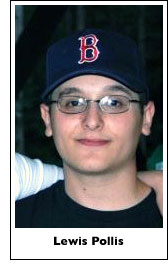Staying strong against Obama peer pressure
Share
by Lewis Pollis, Green Party of Ohio
 We young people are victims of many stereotypes. We have short attention spans. We think we know how to handle all of lifeís problems better than our more-experienced elders. We donít understand the value of a dollar or the satisfaction received from a hard dayís work. My generation (the 20-somethings and younger) takes full advantage of its allotted margin of error. Older people use this to confirm the validity of their complaints about whippersnappers, causing the bar of expectations to drop even lower. It is a vicious cycle that continuously makes us more irresponsible and further convinces our elders we are all hooligans.
We young people are victims of many stereotypes. We have short attention spans. We think we know how to handle all of lifeís problems better than our more-experienced elders. We donít understand the value of a dollar or the satisfaction received from a hard dayís work. My generation (the 20-somethings and younger) takes full advantage of its allotted margin of error. Older people use this to confirm the validity of their complaints about whippersnappers, causing the bar of expectations to drop even lower. It is a vicious cycle that continuously makes us more irresponsible and further convinces our elders we are all hooligans.
While most of this circular logic is ultimately benign (weíll grow out of it eventually, they say), another sort of stereotype has started spreading across the countryóone that is not necessarily good or bad, but will be dangerous if we feel compelled to meet the expectation. We support Barack Obama. We young Americans supported him in the primaries, we voted for him in the general election, and we sure are excited to see him playing fetch with Bo on the White House lawn.
To be fair, the assumption is reinforced by statistics. CNNís exit polling showed two-thirds of the youngest demographicóvoters aged 18-24óchose Obama in the general election. Even in the primaries, young people flocked to him; in Texas, for example, Obama won a filibuster-proof majority from the youngest group despite losing the popular vote as a whole.
I know firsthand how pervasive this assumption is. During the height of the 2008 campaign, the man I pet sit for proudly showed me his Obama bumper sticker. My economics teacher expected me to use her lessons to show my friends why his stimulus plan would help America. And my dentist, still bitter that Fred Thompson was no longer in the race, tried to get a rise out of me by maligning Obama as he dug through my mouth.
I had no problem with correcting peopleís mistakes about my political beliefs. I have even enjoyed the debates that would inevitably follow once people found out I did not support the Democratic candidate. Still, the assumption is a problem to combat, not just in my neighborhood, but across the nation.
Some of my friends truly did like Obama for more than his bandwagon appeal. Some thought that the differences between him and McCain (however small) were important; some were won over by his attitude of tolerance and respect for those different than himself; and some simply wanted to support the man who would become the first African-American president.
But many of my peers had caved in to the pressure of expectations. They were unhappy with his plans to escalate the war in Afghanistan, or to not take drastic action to combat climate change, or to implement a health care system that would not guarantee coverage for all Americans. Disliking McCain even more than Obama, they had resigned themselves to supporting the lesser of two evils. I talked to as many reluctant Obama supporters as I could find, explaining that voting Green was a better option; many of them were convinced.
This is our duty as Young Greens: we must be the missionaries of the Ten Key Values, the preachers of our platform. If there is anything Obama has taught us, it is that we have the power to change our system of government. The future of the Green Party, and any possibility we have of becoming competitive in our lifetimes, lies with us. We must tell our friends and classmates there is another choice, that Rush Limbaugh is not the only one who disagrees with the President, and that itís okay to NOT like Obama.
Lewis Pollis is a new member of the Green Pages Edit Board. He is in his senior year in high school and was editor of presidential candidate Cynthia McKinneyís ìPower to the People Campaignî Newsletter.
I talked to as many reluctant Obama supporters as I could find, explaining that voting Green was a better option; many of them were convinced.




